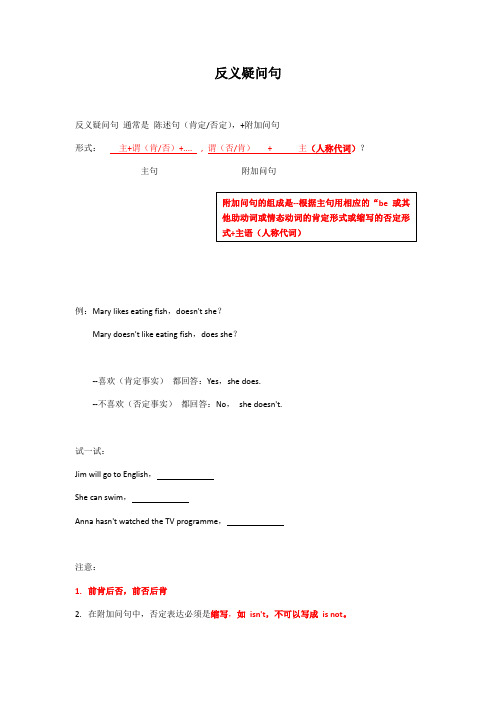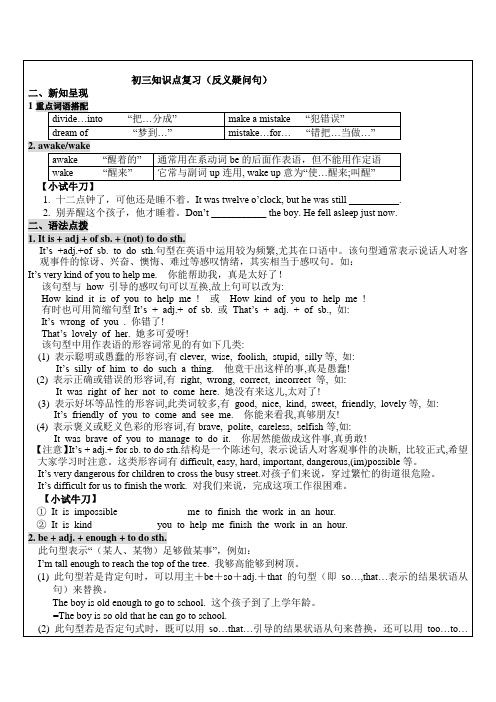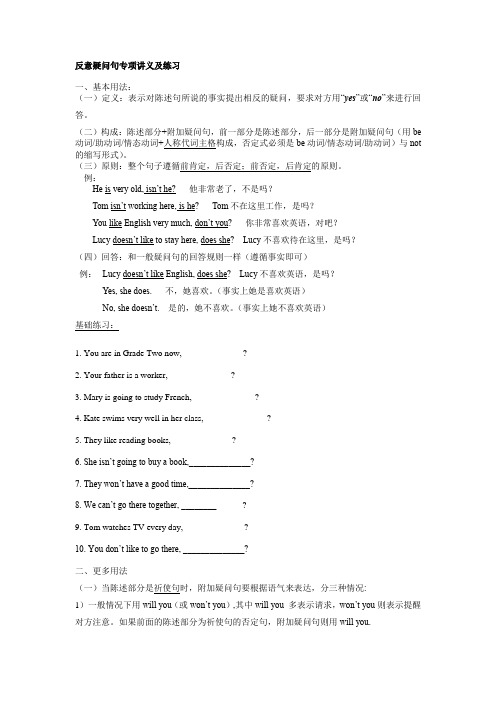中考复习反义疑问句
- 格式:ppt
- 大小:773.00 KB
- 文档页数:8

反义疑问句反义疑问句通常是陈述句(肯定/否定),+附加问句形式:主+谓(肯/否)+.... , 谓(否/肯)+ 主(人称代词)?主句附加问句例:Mary likes eating fish,doesn't she?Mary doesn't like eating fish,does she?--喜欢(肯定事实)都回答:Yes,she does.--不喜欢(否定事实)都回答:No,she doesn't.试一试:Jim will go to English,She can swim,Anna hasn't watched the TV programme,注意:1.前肯后否,前否后肯2.在附加问句中,否定表达必须是缩写,如isn't,不可以写成is not。
3.针对反义疑问句的答句,我们要遵守根据事实答题的原则,不管是前肯后否还是前否后肯,只要肯定事实就答yes,否定事实就答no,特殊情况(考点难点)1.当陈述句中含“few,little,never,hardly,seldom,nobody,no one,nothing,neither,no等否定词时表否定,附加问句要用肯定例:[[[[*但是当陈述句中含否定词缀,如dislike,disagree,unhappy,unlike,careless..等词时,附加问句仍要用否定)例:The girl is very careless,isn't she?2.当主句为一般主从复合句时,附加问句的主谓要和复合句的主句保持一致例:Amy thinks you will come to the party, doesn’t she?*但是当主句为“I think/believe/guess/suppose+宾语从句”时,附加问句的主谓要和复合句的从句保持一致,但是根据主句选用肯定/否定句。
例:I don't think she will come,will she?3.当陈述句中时there be结构时,附加问句用相应的be there 结构。

反义疑问句也叫反义附加疑问句。
它表示提问人的看法,没有把握,需要对方证实。
这一部分的内容在初中英语考试中也是一个常考点,特别是考查学生对疑问句的时态和回答,跟着老师一起来看看初中英语中反意疑问句的14种特殊用法,初中生一定要知道!一、反意疑问句反意疑问句是由陈述句和附在其后的附加疑问句组成。
其中附加疑问句是对陈述句所说的事实或观点提出疑问,起证实作用,一般用于证实说话者所说的事实或观点。
(表示说话者对某事有一定看法,但又不完全确定,需要对方加以证实。
)翻译为“是吗” 二、反意疑问句的回答回答时,事实是肯定的用Yes;若事实是否定的则用No。
三、反意疑问句的特殊情况1.反意疑问句中问句部分的动词与陈述部分的动词在语气上成相反的对应关系,即:肯定+否定?否定+肯定?You can’t do it, can you? 你不能做它,是吗?They are very late for the meeting, aren’t they? 他们开会迟到了,是吗?2.附加问句的主语应与陈述句的主语保持一致,且只能用人称代词替代。
You come from Beijing, don't you? 你来自北京,是不是?3.当陈述句中含有be动词,助动词,或是情态动词时,反问句部分由这些词加上主语人称代词构成:Be动词包括:am, is, are, was, were助动词有:do, does, did, have(用在完成时), has(用在完成时)等情态动词有:can, could, may, might, must, will, would, shall, shouldHe will go home, won’t he? 他要回家了,是吗?She doesn’t like to eat popcorn, does she? 她不喜欢吃爆米花,是吗?4.have的不同用法,反义疑问句用不同的动词(1)have 表“有”时,反义疑问句谓语动词用have/do都行He has a new car, doesn’t/hasn’t he?(2)have表“吃,喝,玩,度过,举办”等是,反义疑问句谓语动词用doHe has supper at home every day, doesn’t he?They had a good time in Beijing, didn’t they?(3)have to表“不得不,必须”时,反义疑问句谓语动词用doKite has to help her mother, doesn’t she?(4)had better表“最好”时,反义疑问句谓语动词用hadWe had better go to school at once, hadn't we?(5)have用在完成时中,反义疑问句谓语动词用haveThey have known the matter, haven’t they?5.(1)反意疑问句的陈述部分带有little, few, never, hardly, seldom,nobody,nothing, no one, none, neither等否定意义的词时,问句部分用肯定式。




反意疑问句专项讲义及练习一、基本用法:(一)定义:表示对陈述句所说的事实提出相反的疑问,要求对方用“yes”或“no”来进行回答。
(二)构成:陈述部分+附加疑问句,前一部分是陈述部分,后一部分是附加疑问句(用be 动词/助动词/情态动词+人称代词主格构成,否定式必须是be动词/情态动词/助动词)与not 的缩写形式)。
(三)原则:整个句子遵循前肯定,后否定;前否定,后肯定的原则。
例:He is very old, isn’t he? 他非常老了,不是吗?Tom isn’t working here, is he? Tom不在这里工作,是吗?You like English very much, don’t you? 你非常喜欢英语,对吧?Lucy doesn’t like to stay here, does she? Lucy不喜欢待在这里,是吗?(四)回答:和一般疑问句的回答规则一样(遵循事实即可)例:--Lucy doesn’t like English, does she? Lucy不喜欢英语,是吗?--Yes, she does. 不,她喜欢。
(事实上她是喜欢英语)--No, she doesn’t. 是的,她不喜欢。
(事实上她不喜欢英语)基础练习:1. You are in Grade Two now,______________?2. Your father is a worker, ______________?3. Mary is going to study French, ______________?4. Kate swims very well in her class, ______________?5. They like reading books,______________?6. She isn’t going to buy a book,______________?7. They won’t have a good time,______________?8. We can’t go there together, ______________?9. Tom watches TV every day,______________?10. You don’t like to go there, ______________?二、更多用法(一)当陈述部分是祈使句时,附加疑问句要根据语气来表达,分三种情况:1)一般情况下用will you(或won’t you),其中will you 多表示请求,won’t you则表示提醒对方注意。
英语“反义疑问句”专项复习一、反义疑问句的基本结构与形式反义疑问句(The Disjunctive Question) 即附加疑问句,是英语四大问句之一。
它表示提问人的看法,没有把握,需要对方证实。
句尾升调表示疑问,降调表示反问。
结构:1. 陈述部分肯定句+疑问部分否定句(可记为前肯后否)。
2. 陈述部分否定句+疑问部分肯定句(可记为前否后肯)。
如:①She often has lunch at school, doesn’t she? ①You don’t like sports, do you?二、反意疑问句通常对应规则一)、肯定+否定?否定+肯定?也就是前肯后否,前否后肯的原则。
如:①You can’t do it, can you? ①They are very late for the meeting, aren’t they?二)、反意疑问句中问句部分的动词与陈述部分的动词种类要对应一致。
如:①He has supper at home every day, doesn’t he? (不能用hasn’t he?)①They have known the matter, haven’t they? (不能用don’t they?)三)、反意疑问句中问句部分的动词在时态上应和陈述部分的时态一致。
如:①They will go to town soon, won’t they?(不能用don’t they?或aren’t they?)①He works very hard, doesn’t he?(不能用didn’t he?或won’t he?)三、反义疑问句的特殊用法1.祈使句后加一个反意疑问句,更加委婉。
肯定祈使句、否定祈使句后的反意疑问句通常只用will you。
但Let’s之后用shall we?。
除Let’s用shall we,其他都用will you。
2.陈述部分的主语是I’m,疑问部分要用aren’t I ? 如:I’m a student, aren’t I?3.陈述部分的主语是wish,疑问部分要用may I? 如:I wish to have a word with you, may I?4.陈述句部分主语是everything, something, anything, nothing时,其后的反意疑问句主语用it。
中考英语反义疑问句讲解及习题一、英文中的反意疑问句什么是反意疑问句英语中,反意疑问句是由陈述句和附在其后的附加疑问句组成。
其中附加疑问句是对陈述句所说的事实或观点提出疑问,起证实作用,一般用于证实说话者所说的事实或观点。
(一)、反意疑问句中问句部分的动词与陈述部分的动词在语气上成相反的对应关系,即:肯定+否定否定+肯定如:①You can’t do it, can you②They are very late for the meeting, aren’t th ey(二)、反意疑问句中问句部分的动词与陈述部分的动词种类要对应一致。
如:①He has supper at home every day, doesn’t he (不能用hasn’t he)②They have known the matter, haven’t they (不能用don’t they) (三)、反意疑问句中问句部分的动词在时态上应和陈述部分的时态一致。
如:①They will go to town soon, won’t they②He works very hard, doesn’t he(四)、反意疑问句的陈述部分含有由un-, im-, in-, dis-, 等否定意义的前缀构成的词语时,陈述部分要视为肯定含义,问句部分用否定形式。
如:①Your father is unhappy, isn’t he②The man is dishonest, isn’t he③It is impossible to learn English without remembering more words, isn’t it(五)、反意疑问句的陈述部分带有little, few, never, hardly, seldomNobody,nothing等否定意义的词时,问句部分用肯定式。
如:①She never tells a lie, does she (不用doesn’t she)②He was s eldom late, was he (不用wasn’t he)(六)、反意疑问句的陈述部分为I am……时,问句部分习惯上用aren’t I 表示。
中考考点十四反义疑问句中考考点十四:反意疑问句一、结构:陈述句+ 附加疑问句?It’s hot today ,isn’t it ?二、原则:1.前肯后否,前否后肯2.前名后代3.时态一致三、变法:一疑、二否、三连、四省、五转换(名变代)。
四、特殊的附加疑问句:1.I’m …… , aren’t I ?I’m right , ______ ______ ?2.There be …… , ______ there ?There will be fewer buses in the future ,____ ______?3.句中有反义词的句子的反意疑问句,仍把它作为肯定形式。
He is unhappy , _____ ______ ?4.Let’s 的反意疑问句为shall we ?Let’s go to the movie together ,_____ _____ ?5.祈使句的反意疑问句为will you ?Don’t miss it ,_____ _____ ?6.若陈述句部分含有never , few , little , hardly ,no ,seldom ,nobody ,nothing …否定词、半否定词时,附加疑问句用肯定形式。
He can hardly understand it , _____ ______ ?7.陈述句的主语为不定代词时:1).主语为指人的不定代词时,附加疑问句的主语用he / they .No one was hurt , ______ _______ ?2).主语为指物的不定代词时,附加疑问句的主语用it.Nothing is serious , _______ _______ ?8.表推测的情态动词的附加疑问句,其附加疑问句与情态动词后的动词一致。
He must be at school , ______ ______ ?9.陈述句的主语是this , that , these , those 时,附加疑问句的主语分别为it , they . This is a new computer , ______ ______ ?Those aren’t banana tees , ______ _______ ?10.当陈述句是主从复合句时,其附加疑问句应与主句保持一致。